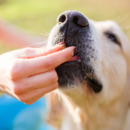Most dog owners have a deep love for dogs, frequently treating them as part of the family. Global trends have seen an increasing number of people are opting to own dogs instead of having children, and with the resources available they will spoil their dogs to an extent that used to be rare. This is a good thing, as there is now increased interest in caring for dogs in an ethical and responsible way.
Better training, better food and better breeding practices will all benefit the animals in the long run.
Dogs take part in many of their owner’s activities, from eating dinner to taking vacations. Many dog owners will even let their dogs sleep in the same bed as them at night. However, this brings up an issue that many dog owners are familiar with: a snoring dog. While many dogs will snore gently, some dogs can have earth-shaking snores, just like humans.
Dogs snore for a variety of reasons, and just like humans, there are certain times when a dog’s snoring is no longer normal.
It’s important to be aware of the causes of snoring in dogs and how to tell when a dog’s snoring is no longer normal or indicative of a bigger health issue.
Why Does my Dog Snore?
Anatomy
The primary cause for dog’s snoring is usually related to their anatomy—specifically their size and shape of their head and muzzle. For example, brachycephalic breeds with short faces (such as Pugs) tend to have more difficulty breathing than those with longer muzzles (such as Labradors).
There is an ongoing call for brachycephalic dogs to be bred with longer snouts, which may help reverse some of the breathing problems for these breeds. Some responsible dog breeders in Australia have already begun to do so.
Weight
Another common cause of snoring in dogs is obesity. Just like in humans, excess weight can place pressure on the airways and restrict airflow, which leads to snoring.
If your dog is overweight or obese, it’s important to take steps to help them lose weight before their snoring becomes a health concern. This can include adjusting their diet and increasing their exercise levels.
Allergies
Another common cause of snoring in dogs is nasal congestion due to allergies or illness. Dogs with allergies may suffer from inflamed nasal passages that restrict the flow of air through the nose, leading to noisy breathing patterns such as snoring.
Similarly, illnesses like kennel cough (infectious tracheobronchitis) can cause inflammation of the throat and airways that results in loud breathing while sleeping.
Age
Sometimes, age-related changes can also lead to increased levels of snoring in older dogs as they naturally lose muscle tone throughout their bodies as they age – including their throats and tongues.
This can lead to an increased likelihood of soft tissue collapsing over the airway during sleep, resulting in noisy breathing patterns such as regular snoring or even laboured breathing noises.
Abnormalities
In some cases, anatomical abnormalities such as elongated soft palates or narrow nostrils can contribute to noisy breathing patterns during sleep; however, these conditions are usually present from birth so most owners will be familiar with any anatomical issues that could be causing excessive noise while their dog sleeps.

Is My Dog’s Snoring Normal?
Now that we know what causes dogs to snore, let’s look at how you can tell if your dog’s snoring is normal or if there is something else going on that needs attention from a veterinarian.
Monitor sleeping habits
It’s important that you monitor your dog’s sleeping habits so that you can look out for any changes in their breathing patterns or sound of their breath coming out of their nose or mouth while sleeping.
If you notice any changes in your pup’s breathing pattern such as heavy panting, gasping for air or prolonged periods without taking breaths, then these could be signs that something else is going on with your pup and they should see a vet immediately for further evaluation.
Another sign of abnormality in regards to your pup’s snoring is if they are having trouble staying asleep throughout the night or are waking up frequently throughout the night due to difficulty breathing.
This kind of symptom could signify an underlying health issue, and should be checked out by a vet right away for further evaluation and treatment, if necessary.
Monitor signs
If you notice any discharge coming from either the nose or mouth during sleep, then this could also indicate an infection or other problem that needs medical attention from a vet right away.
It’s also worth noting that while regular bouts of heavy/laboured breathing during sleep may not necessarily be indicative of anything serious happening with your pup – especially if this is something you have noticed since they were younger – it’s always wise to rule out any underlying issues that may be causing this type of noise through regular check-ups with your vet, just in case.
Summary
Most instances of dog snoring are considered normal behaviour caused by structural issues with their airway such as a small nose/throat or obesity/allergies.
However, it’s important that pet owners keep an eye out for any changes in their pup’s breathing pattern while asleep, which could signify an underlying health issue requiring immediate medical attention.







